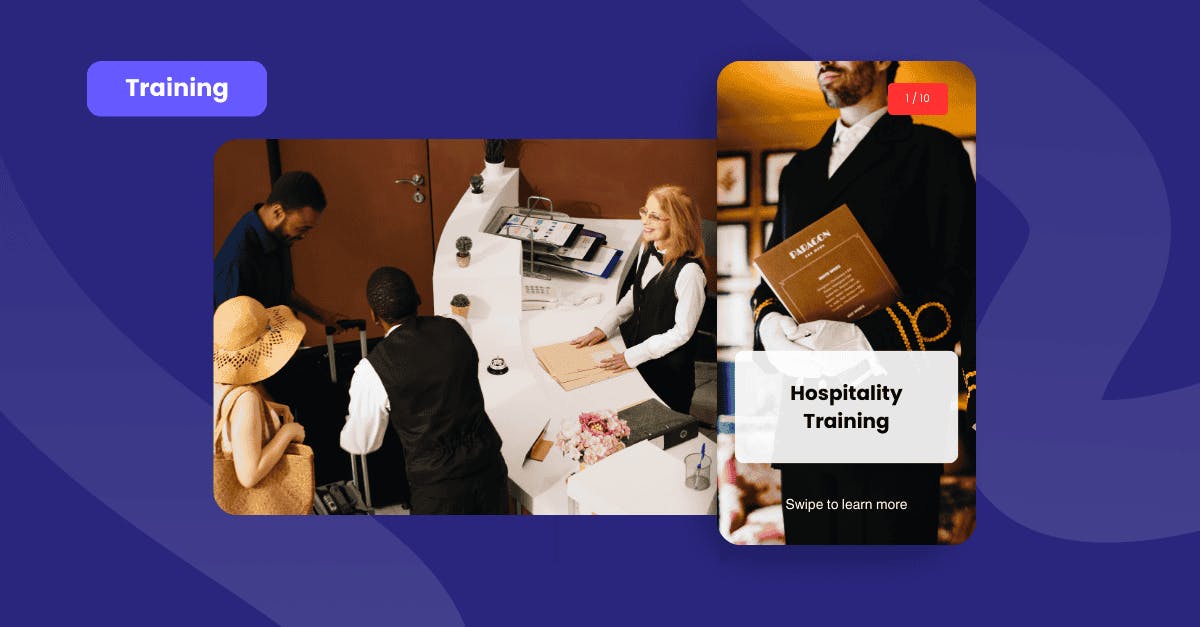What is hospitality training? A complete guide
Published
October 8, 2024
Author
Share
Whether you’re whipping up delicious meals or making guests feel like they’re in the lap of luxury, effective hospitality training lays out the foundation for excellence. It empowers teams to deliver personalized service that gives thoughtful touches, anticipates needs, and maintains the highest standards.
Here at SC Training, we go the extra mile to guarantee that teams master the art of hospitality through a top-notch learning experience. Explore how we can revolutionize your training approach in this complete guide, featuring a list of courses to refine every aspect of guest service and operational success.
What is hospitality training?
For businesses in hospitality, the ultimate goal is to drive satisfaction that keeps customers happy. But what exactly makes a hotel feel just like home? How does a resort offer the vacation of a lifetime? What elements create a dining experience that stays with you? There’s no one-size-fits-all answer. But the path to achieving these experiences starts with good hospitality training.
This training develops the skills, knowledge, and abilities of teams in the hospitality industry. This industry encompasses four main areas: Travel and tourism, food and beverage, recreation and entertainment, and lodging.
Because of the broad nature of hospitality, training will vary depending on the specific needs of your organization and employees. But, regardless of your role or the type of training, customer service will always lie at the core as it drives the satisfaction that defines guest experiences.
Why is training important in the hospitality industry?
It’s a no-brainer—workplace training is essential in every industry. Training in hospitality is essential because customer satisfaction is the driving force for growth in the field. Here are more reasons why you should invest in hospitality industry training:
Increase brand loyalty
How do you keep customers satisfied in hotels, resorts, cruises, restaurants, and bars? Yes, investing in amenities and niceties will entice guests. But exceptional customer service will keep them coming back – and that starts with your teams.
Training develops critical skills and knowledge that’ll help your teams deliver quality service. This way, guests are kept happy and satisfied before, during, and after their stay. A well-rounded experience builds loyalty, helping you gain repeat customers.
Instill company values
Whether they work front or back of house, employees have a crucial role to play in making guest experiences better. Investing in guest experiences means investing in training. Hospitality industry training sets a standard of consistency that reflects your organization’s values.
Training is the perfect time to refresh your team’s knowledge on what your company is all about. Reviewing the company mission, core values, and policies will help your teams live up to these standards in their day-to-day responsibilities.
Tackle tough situations
Good training can also help employees remain calm during difficult situations, including when emergencies occur and when handling complaints. This means that teams will understand how to stabilize situations and keep guests and their peers safe at all times.
Boost professional development
Well-trained staff improves the overall customer experience. But it also benefits your teams as it helps them stay up to date with changing trends, lessens employee turnovers, and improves job satisfaction levels.
5 Essential hospitality skills
Hospitality often involves teams facing different customers and distinct situations. Teams in this industry need a wide range of skills to contribute to building better customer experiences. Discover five of the most essential hospitality skills you can incorporate to elevate your team’s training and performance.
Communication
Knowing how to communicate effectively is key to getting the right message across. Communication is a crucial skill when dealing with queries and problems addressed by customers. It’s also important to collaborate with team members to give guests a positive experience.
Problem-solving
Hospitality staff have a lot to juggle on their plate. Whether it’s lack of manpower, overbooking your hotel, or having to do a grocery run in the middle of the night to replenish supplies, tackling problems head-on is important to do their jobs effectively.
When faced with customer complaints, it’s important to listen proactively and keep calm, even if the customer isn’t. One bad review can cause a ripple effect, which can be detrimental to businesses like restaurants and hotels heavily rely on word of mouth. So it’s crucial to develop their problem-solving skills through training.
Industry Awareness
For all areas within hospitality, your teams should always be updated about industry standards and procedures. An easy way to do this is to deploy refresher training now and then on top of the initial training they’ve received to guarantee that your teams stay aware of trends and changes that are relevant to their roles.
Attention to Detail
Anticipating your customers’ needs is what sets a good hospitality business apart from the rest. Instilling strong attention to detail is important in every role in hospitality – regardless if it's for front desk training or food safety courses. This guarantees that your organization is maintaining consistently high standards of customer service.
Empathy
When dealing with customers, it’s important that an employee can place themselves in the guest’s shoes to understand the issues they face and resolve them effectively. Sharing the feelings of a customer allows teams to genuinely connect with guests, which generally makes them happier and can have a positive impact on revenue.
How to train your hospitality staff
Discover what makes a good hospitality staff training with this list of best practices to guide you in creating better experiences for your customers.
- Create an effective onboarding process: How you onboard new team members sets the tone for all that’s to come. This process should reflect your company culture, set expectations on guidelines and policies, and familiarize employees with your business’ story.
- Make brand training a must: Many hospitality staff create the first – and arguably most important – impression about your brand to guests. Familiarize your team with the company’s brand standards so that they can carry a consistent message in all the work they do.
- Train often and train with purpose: Training shouldn’t be a one-and-done thing. Continuous training activities keeps teams competitive and up-to-date on the latest industry trends and changes in compliance standards.
- Incorporate technology: In the fast-paced, demanding world of hospitality, using technology in your training can make it more flexible for your teams. You can do this through online learning like online customer service courses or platforms like an all-in-one LMS or mobile learning.
- Offer training in different languages: Many hospitality businesses have locations and workers from different parts of the world. Make sure that training remains as effective as possible by translating training materials to commonly spoken languages among your teams. This guarantees that training remains accessible, increasing comprehension and retention rates.
- Make training interactive: Training doesn’t have to be dull and monotonous. Keep teams engaged in training by prioritizing interactivity through gamification and incentives.
- Pair theoretical and practical training: Both types of training are equally important in hospitality. Incorporate hands-on experiences like role-playing or mentorship to enhance your team’s skills and abilities.
Key hospitality training topics & recommended courses
We’ve curated a list of some of the most important training topics, paired with hospitality courses online, that you should prioritize for your teams.
1. Back of House (BOH) and Front of House (FOH)
- Recommended Course: Getting to Know Your Restaurant’s FOH and BOH
In restaurants and hotels, FOH and BOH staff hold equal weight in defining operational success. FOH greets and serves the customers, while BOH works behind the scenes in kitchens, engineering, maintenance, and more. Courses on this topic typically dive into the differences between the two and ways to increase coordination between them.
2. Food Safety
- Recommended Course: Food Safety Standards
Food safety is important in keeping customers protected from food-borne illnesses and food safety risks. Safety standards typically vary from country to country so it’s important that your training gets your teams the appropriate hospitality training certificate. Other specific examples of courses on this topic can include food allergy training and food contamination training.
3. De-escalation
- Recommended Course: De-escalation Training
Sometimes, undesirable customer situations are inevitable. It’s important to equip your staff with de-escalation training that let them diffuse tension and guarantee a safe environment for themselves and your customers. Courses on this topic typically discuss body language, occupational violence and aggression, and tips on conflict resolution.
4. Hygiene Standards
- Recommended Course: Grooming Standards (US)
Many teams in hospitality have close encounters with guests or are responsible for handling food and drinks. Personal hygiene is important in preventing the spread of diseases and in maintaining a professional image when facing guests. This also translates to keeping facilities clean for the health and satisfaction of customers.
5. Working with Customers
- Recommended Course: Creating a Positive Customer Experience
Last but not least, it’s extremely important to train hospitality professionals on how to build good customer relationships. Under this topic, employees are trained to support better guest experiences through empathy and good communication and interpersonal skills.
Transform guest experiences with SC Training
Customers know when employees have received quality, consistent training. At SC Training, we specialize in creating workplace learning experiences that go beyond simply improving your teams — they resonate with customers and drive meaningful connections.
Explore how you can use SC Training to redefine how your teams train:
- Fast authoring: SC Training houses three kinds of fast authoring tools so you can fast-track course creation. Use AI Create for intelligent content creation, access our Course library with 1,000+ ready-made courses, or take advantage of our Course Creation Services and let our in–house instructional designers breathe life to your training.
- AI Translation: Make your courses accessible to your teams all over the world. Translate content into over 100 languages with a click of a button and smash through language barriers.
- Gamification: Say goodbye to boring training with gamification. Teams can tap and swipe their way through lessons while improving retention rates and increasing productivity.
- Microlearning: Microlearning content is designed to work with the busy schedules of teams in hospitality. Finish training in less than 5 minutes with highly-targeted courses that are accessible through mobile devices.
We’re here to take the brunt of the work off your hands with powerful features that make training a breeze. Join brands like The Grounds and Finns Bali in giving customers the experience they deserve and in transforming how teams train.
Master the art of customer service with the leader in hospitality training. Join SC Training today!
Author
Bea Garcia
Bea Garcia is a content specialist at SC Training, a cutting-edge e-learning platform commited to delivering experiences that empower frontline teams. She specializes in creating tailored content for the hospitality, retail, and SaaS industries, offering training solutions that address the unique challenges of each sector. Beyond writing, she spends her time trying out recipes and watching films.

